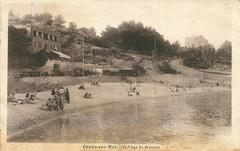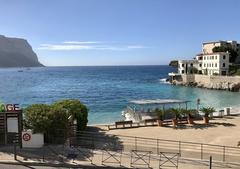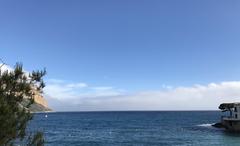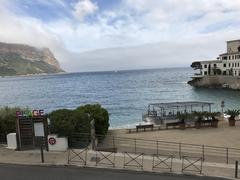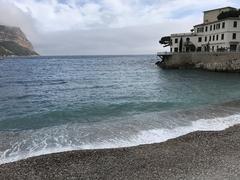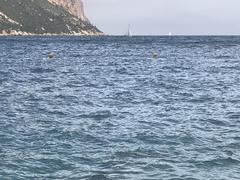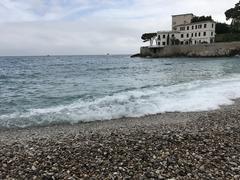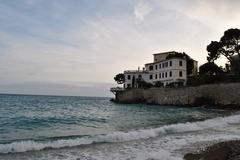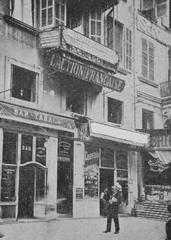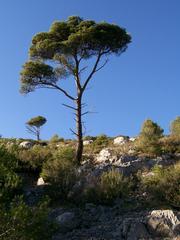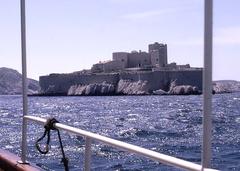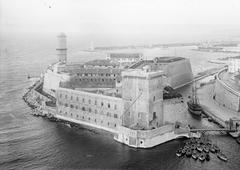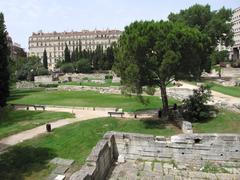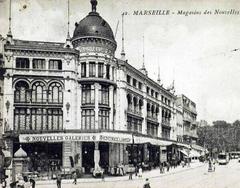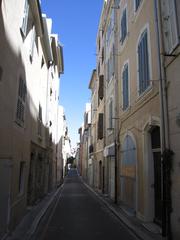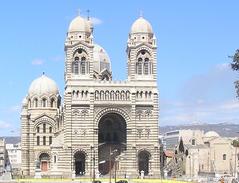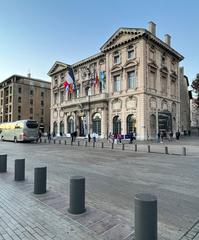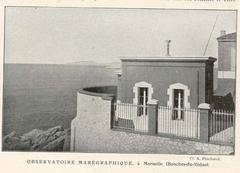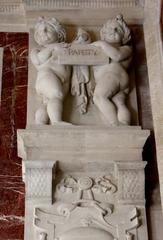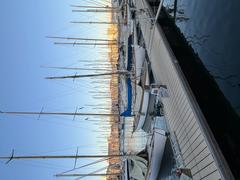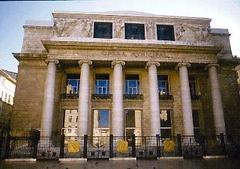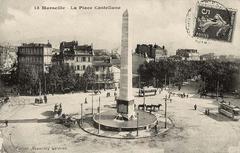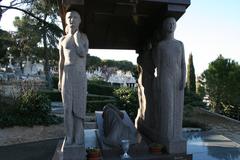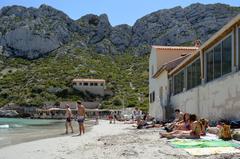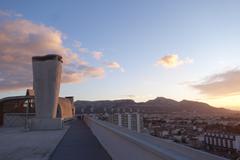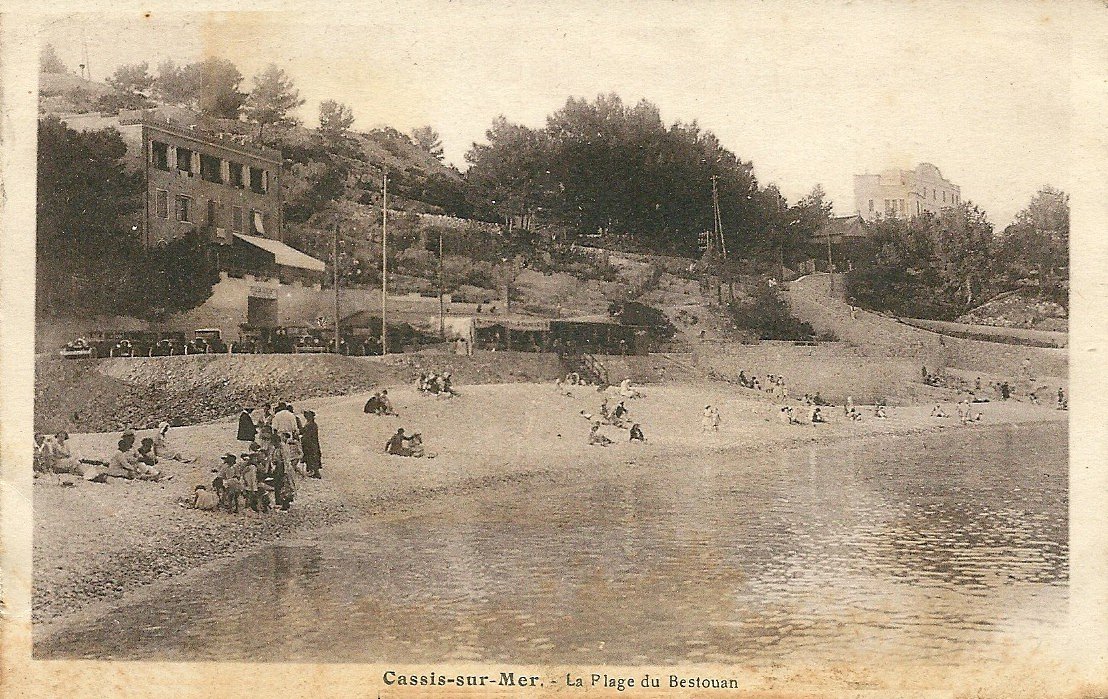
Le Bestouan Visiting Guide: Hours, Tickets, and More
Date: 20/07/2024
Introduction
Le Bestouan Beach, nestled in the picturesque Calanques National Park near Marseille, is a hidden gem that offers visitors a unique blend of historical intrigue and natural beauty. Renowned for its crystal-clear waters and stunning landscapes, Le Bestouan is a favorite destination for both locals and tourists seeking a tranquil escape. The beach’s rich history, which dates back to prehistoric times, is intertwined with the broader historical narrative of the Calanques region. From ancient maritime trade routes during the Roman era to a refuge during the Middle Ages, Le Bestouan has evolved into a significant site for leisure, scientific research, and conservation efforts (Calanques National Park, Cassis Tourism, Le Bestouan Beach).
Today, Le Bestouan is part of the Calanques National Park, established in 2012 to protect its unique biodiversity and geological formations. The park spans over 520 square kilometers and is home to a diverse range of flora and fauna, making it a crucial site for ecological research and environmental conservation. Visitors to Le Bestouan can enjoy a plethora of activities, from swimming and snorkeling in its clear waters to hiking and exploring the nearby trails of the Calanques. This comprehensive guide aims to provide essential information on visiting hours, ticket prices, nearby attractions, and practical tips, ensuring a memorable and enriching experience at Le Bestouan Beach (Calanques National Park, Cassis Tourism, Le Bestouan Beach).
Table of Contents
History and Significance
Historical Background
Le Bestouan, a picturesque beach located in the Calanques National Park near Marseille, France, has a rich history that intertwines with the broader historical narrative of the region. The Calanques, a series of rocky inlets along the Mediterranean coast, have been inhabited since prehistoric times. Archaeological evidence suggests that early humans settled in these areas, utilizing the natural caves and resources available. The region’s strategic location along the Mediterranean made it a significant site for ancient maritime trade and cultural exchanges.
During the Roman era, the Calanques, including Le Bestouan, were part of the broader province of Gallia Narbonensis. The Romans recognized the strategic importance of the coastline and established several settlements and ports in the area. The remnants of Roman infrastructure, such as roads and aqueducts, can still be found in the region, highlighting its historical significance.
Evolution Through the Ages
In the Middle Ages, the Calanques served as a refuge for local populations during times of conflict. The rugged terrain and hidden coves provided natural fortifications against invaders. Le Bestouan, with its secluded beach and clear waters, was likely used by fishermen and local communities for sustenance and trade. The region’s natural beauty and resources continued to attract settlers and visitors throughout the centuries.
The 19th and 20th centuries marked a period of transformation for Le Bestouan and the surrounding Calanques. The advent of industrialization and urbanization brought significant changes to the region. Marseille, as a major port city, experienced rapid growth, and the Calanques became a popular destination for leisure and recreation. The construction of roads and railways made the area more accessible, attracting tourists and nature enthusiasts.
Modern Significance
Today, Le Bestouan is renowned for its stunning natural beauty and crystal-clear waters. It is a popular destination for both locals and tourists seeking a tranquil escape from the bustling city of Marseille. The beach is part of the Calanques National Park, which was established in 2012 to protect the unique biodiversity and geological formations of the region. The park covers an area of over 520 square kilometers, encompassing both land and sea, and is home to a diverse range of flora and fauna.
Le Bestouan’s significance extends beyond its natural beauty. The beach and the surrounding Calanques are important sites for scientific research and conservation efforts. The unique marine and terrestrial ecosystems provide valuable insights into the region’s ecological history and the impacts of climate change. Researchers and conservationists work tirelessly to preserve the delicate balance of these ecosystems, ensuring that future generations can continue to enjoy the natural wonders of Le Bestouan.
Cultural Impact
Le Bestouan and the Calanques have also had a profound impact on the cultural landscape of Marseille and the broader Provence region. The rugged beauty of the coastline has inspired countless artists, writers, and musicians. The Calanques have been featured in numerous works of literature and art, capturing the imagination of people around the world.
The beach itself has become a symbol of the Mediterranean lifestyle, characterized by a deep connection to nature, a love for outdoor activities, and a relaxed, leisurely pace of life. Visitors to Le Bestouan can experience this unique cultural heritage firsthand, whether through swimming in the clear waters, hiking along the scenic trails, or simply enjoying a leisurely picnic on the beach.
Visitor Information
Opening Hours, Ticket Prices, and Accessibility
Le Bestouan Beach is open to the public year-round. However, the best times to visit are during daylight hours, particularly in the summer months when the weather is ideal for beach activities. There is no entrance fee to visit Le Bestouan, though parking fees may apply if you are driving to the beach.
The beach is accessible by car, with parking available nearby. However, during the peak summer months, parking can be limited, so it is advisable to arrive early or consider using public transportation. The nearest train station is in Cassis, a charming town located just a short distance from Le Bestouan. From Cassis, visitors can take a bus or taxi to the beach.
Le Bestouan is a pebble beach, so it is recommended to bring appropriate footwear for walking on the rocky terrain. The clear waters are ideal for swimming and snorkeling, and visitors can rent equipment from local vendors. There are also several cafes and restaurants nearby, offering a range of dining options from casual snacks to gourmet meals.
Nearby Attractions and Activities
While visiting Le Bestouan, consider exploring other attractions in the Calanques National Park and the surrounding area. Popular activities include hiking, rock climbing, and boat tours, which offer breathtaking views of the rugged coastline and hidden coves. The town of Cassis is also worth exploring, with its charming harbor, local markets, and historic sites.
Environmental Considerations
As part of the Calanques National Park, Le Bestouan is subject to strict environmental regulations to protect its unique ecosystems. Visitors are encouraged to follow the Leave No Trace principles, ensuring that they do not disturb the natural environment or leave behind any litter. The park authorities also conduct regular patrols to monitor and enforce these regulations, ensuring that the area remains pristine for future visitors.
FAQ
What are the visiting hours for Le Bestouan? Le Bestouan is open to the public year-round. However, the best times to visit are during daylight hours, particularly in the summer months when the weather is ideal for beach activities.
Is there an entrance fee for Le Bestouan? There is no entrance fee to visit Le Bestouan. However, parking fees may apply if you are driving to the beach.
How can I get to Le Bestouan from Marseille? You can take a train from Marseille to Cassis, and then a bus or taxi to Le Bestouan. Alternatively, you can drive directly to the beach, keeping in mind that parking can be limited during peak times.
Conclusion
Le Bestouan Beach in Marseille is a site of immense historical, cultural, and ecological significance. Its rich history, stunning natural beauty, and unique cultural heritage make it a must-visit destination for anyone traveling to Marseille and the Provence region. By respecting the natural environment and embracing the local culture, visitors can enjoy a truly memorable experience at this remarkable beach. For more detailed information and updates, visit the Marseille Tourism Office website and consider downloading the Audiala mobile app for the latest tips and updates on top destinations in Marseille (Calanques National Park, Cassis Tourism, Le Bestouan Beach).
